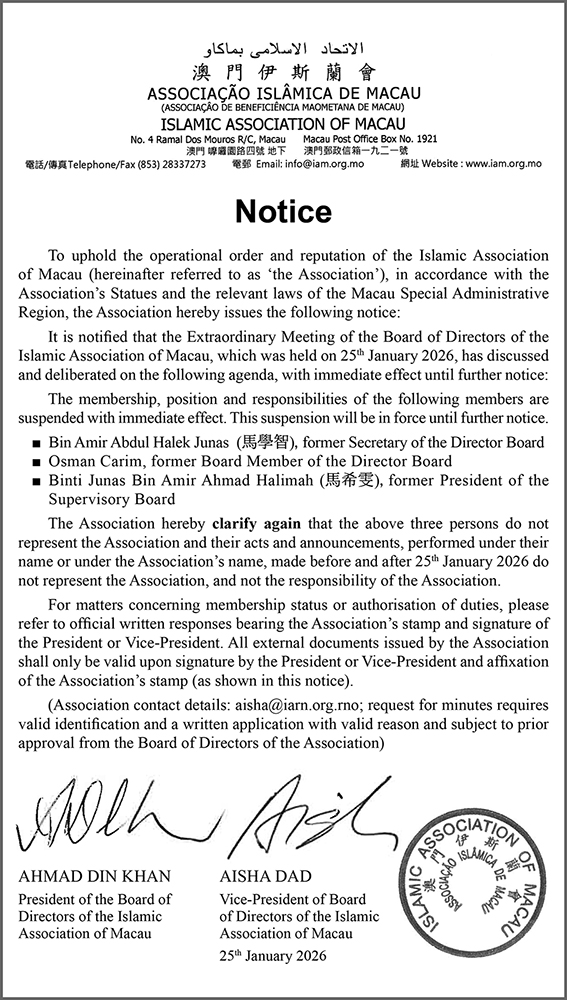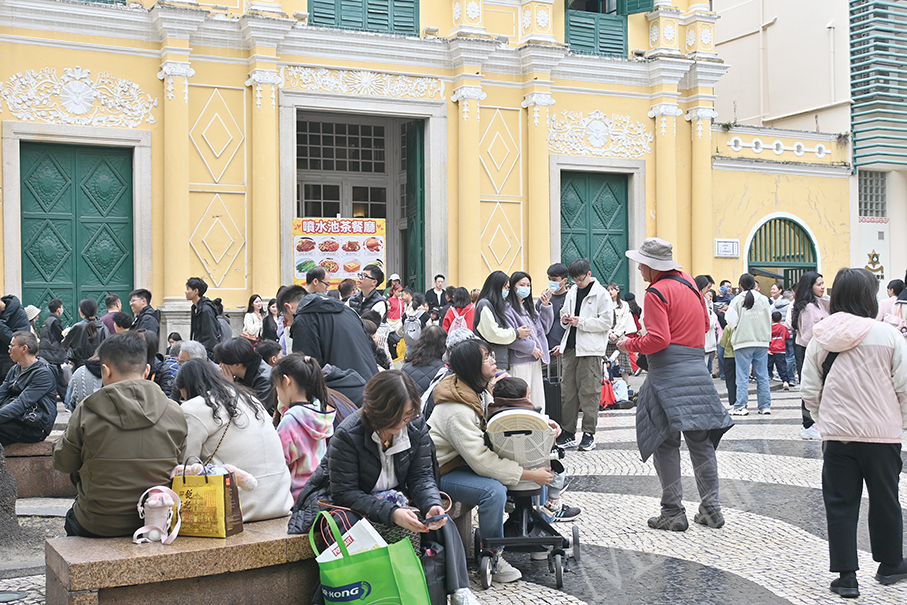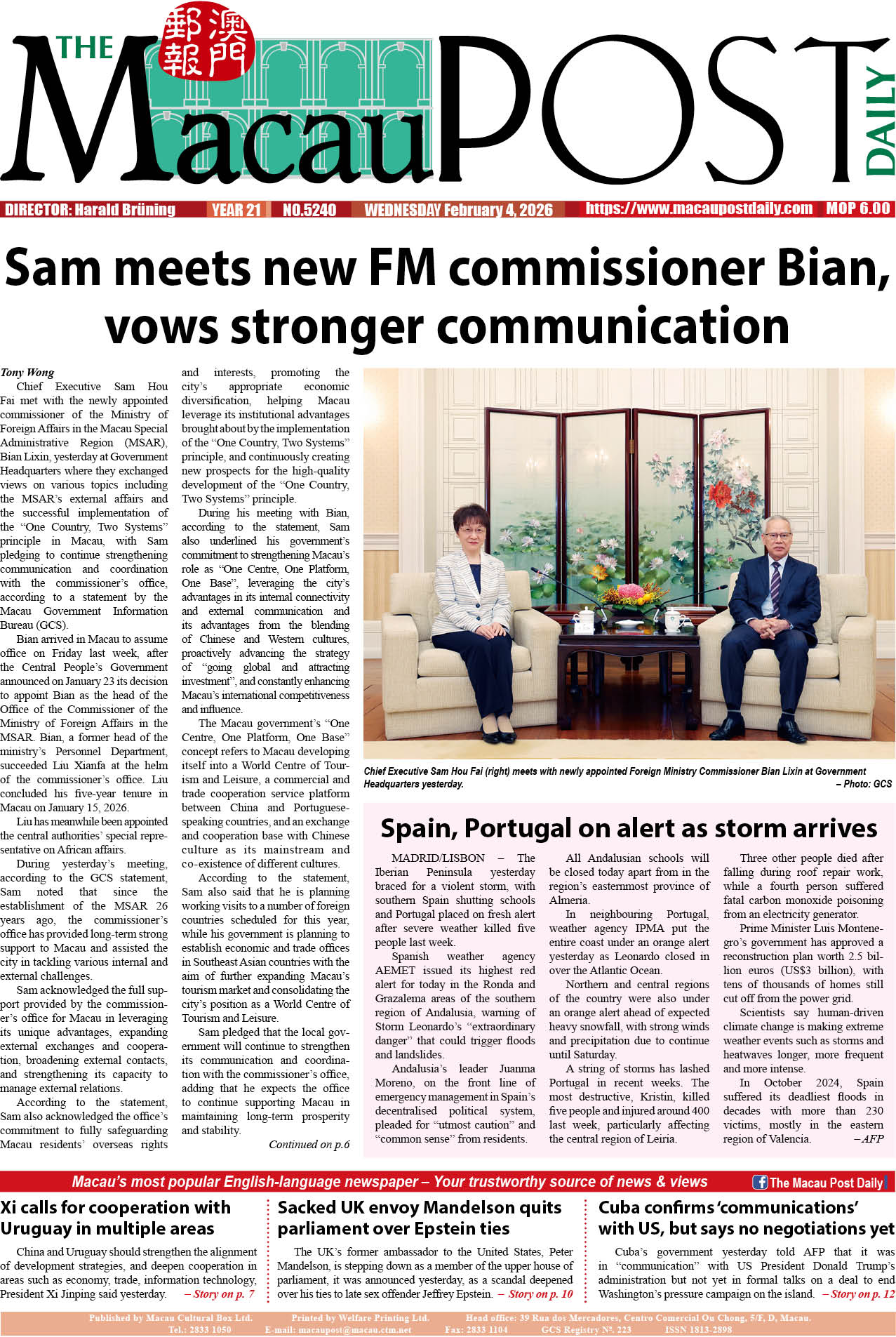The Health Bureau (SSM) said yesterday that the government plans to extend the ongoing COVID-19-control consolidation period, which is slated to end at 11:59 p.m. tomorrow, for three more days through Monday next week, after which Macau can enter a COVID-19-prevention stabilisation period that will allow restaurants to resume dine-in services and more businesses to resume operations provided that the government’s upcoming citywide nucleic acid testing (NAT) drive for everyone on Saturday and Sunday comes up with “a good result”.
The possible stabilisation period, the duration of which is still yet to be decided, will have various COVID-19 measures gradually relaxed, such as less frequent mandatory nucleic acid tests for those who leave home for work, and only requiring the wearing of surgical facemasks when out and about.
However, the bureau said yesterday, those who have a meal in restaurants or need to stay in certain indoor facilities for a relatively long time, such as tutorial centres, during the stabilisation period will be required to display a negative COVID-19 NAT result valid for 48 hours.
The bureau also said yesterday that everyone will be required to continue to self-test for COVID-19 with a rapid antigen test (RAT) kit every day at least for the first seven days during the stabilisation period.
Leong Iek Hou, who heads the Communicable Disease Prevention and Control Division of the Health Bureau, made the remarks during yesterday evening’s daily press conference about the viral menace.
Current outbreak records zero cases
The latest tally of Macau’s current COVID-19 outbreak, which was detected on June 18, has remained unchanged at 1,816, the Novel Coronavirus Response and Coordination Centre announced in a statement yesterday morning.
It is the first time since the current outbreak that no new cases have been reported, and it is also the fourth consecutive day that no community cases were detected.
According to yesterday morning’s statement, the zero growth in new cases were recorded between 00:00 a.m. and 11:59 p.m. on Tuesday. The statement meant that no new cases were detected in locked-down (Red Code Zone) buildings and medical observation quarantine hotels either.
The government started a seven-day period aiming to consolidate Macau’s achievements in its battle against the current COVID-19 outbreak on Saturday last week. The ongoing seven-day consolidation period came after Macau went through a 12-day period that enabled the city to maintain a state of “relatively static” movement of people.
During the then 12-day “relatively static” period, which ran from July 11 to Friday last week, all businesses were ordered to close except those essential for maintaining civil society’s normal functioning or residents’ daily lives. During the ongoing seven-day consolidation period, a wide range of non-essential businesses have been allowed to resume operations in a limited way provided that they comply with the government’s special COVID-19 prevention and control measures.
During the then “relatively static” period, everyone was ordered to stay at home unless going to work, buying daily necessities, or going out for other very necessary tasks or urgent matters, such as going to NAT stations for their mandatory tests or going to healthcare facilities to seek medical treatment. During the ongoing consolidation period, people have been allowed to leave home for engaging in more types of essential activities, such as having a walk near their home, taking their dogs out for a walk near their home, and buying other goods. However, people are not allowed to go for a run because jogging wearing a facemask is harmful to their health. Nevertheless, the government strongly advises people not to leave home unless necessary during the current consolidation period.
The government’s mandatory requirement for all adults to wear a KN95 facemask when out and about has remained in force since the current consolidation period commenced on Saturday last week.
Restaurants’ dine-in services continue to be prohibited during the current consolidation period.
During yesterday’s press conference, Leong said that the Health Bureau is aware that civil society is eager to know more about the government’s new anti-COVID-19 arrangements and measures that will be implemented after the current seven-day consolidation period is slated to end at 11:59 p.m. tomorrow, because of which she announced the government’s provisional plan on the matter.
Leong reaffirmed that although Macau has had no COVID-19 community cases for four days in a row, the government is still unable to confirm whether hidden COVID-19 cases have been cleared in the community because it has only been carrying out regular mandatory nucleic acid tests this week for those in high-risk key occupations, all those who leave home for work, and those living or working in certain neighbourhoods classified as high-risk key areas, without carrying out citywide nucleic acid tests for everyone.
Only after the upcoming Saturday-Sunday citywide NAT round has been carried out, Leong said, will the government have a good understanding of whether Macau has completely reached zero cases in the community.
In the run-up to the upcoming mass NAT round, Leong said that if Macau continues to have zero COVID-19 community cases every day, or reports a very small number of such cases whose infection sources can be identified, the government will extend the current consolidation period, which is slated to end at 11:59 p.m. tomorrow, for three more days through Monday next week.
Leong said that if the upcoming Saturday-Sunday citywide NAT round comes up with “a good result”, the consolidation period’s three-day extension will end at 11:59 p.m. on Monday as scheduled, after which Macau can enter a COVID-19-prevention stabilisation period that will gradually relax various COVID-19 measures.
The stabilisation period aims to continue stabilising Macau’s COVID-19 situation, Leong said.
Dine-in entails higher risk
During the stabilisation period, Leong said, restaurants will be allowed to resume dine-in services. However, Leong said that as eating and drinking will require removing a facemask, restaurants’ dine-in services will entail an increased COVID-19 transmission risk, because of which, she said, strengthened and supplementary measures will be needed with the aim of minimising the risk.
The measures, according to Leong, will include a limit on the number of patrons, and the mandatory display of a negative COVID-19 NAT result valid for 48 hours.
In addition, Leong said, a COVID-19 NAT result will also be required for those who need to stay in certain indoor venues for a relatively long time despite the fact that they can wear a facemask all the time there, such as tutorial centres and other continuing education centres.
Initially after the stabilisation period commences, Leong said, everyone will have to continue to self-test for COVID-19 with an RAT kit every day. She said that for the time being the government is planning for such a requirement to provisionally last at least one week.
Leong was adamant that the government will not consider a measure that would allow restaurants’ dine-in patrons to display a negative RAT result instead, as everyone is required to undergo a self-test every day anyhow.
Leong also said that during the stabilisation period, those in high-risk key occupations will have to continue to undergo relatively frequent mandatory nucleic acid tests. Currently, they are required to undergo a nucleic acid test every day.
Leong said that during the stabilisation period, all those who leave home for work but are not in key occupations, who are currently required to undergo a nucleic acid test every other day, can have their testing requirements relaxed to a test every three days.
According to Leong, the three types of businesses that are not allowed to operate during the current seven-day consolidation period, namely day nurseries, indoor renovation projects, and shopping centres, may be allowed to resume operations in a limited way during the stabilisation period.
Leong also said that some additional other businesses and facilities whose operations are currently still banned could also gradually resume their operations during the possible stabilisation period.
According to Leong, the government’s current mandatory requirement for all adults to wear a KN95 facemask when out and about could be relaxed for the stabilisation period, during which they will only be required to wear a surgical facemask when engaging in outdoor activities. However, Leong said, the government will strongly advise people to wear a KN95 facemask indoors during the stabilisation period.
Meanwhile, Leong also said that those who leave home for work, who would be required to undergo a nucleic acid test every three days during the stabilisation period, will not need to undergo extra tests if they want to dine in restaurants, because a NAT result valid for 48 hours means that the 48-hour validity will only start on the day after the sampling day.
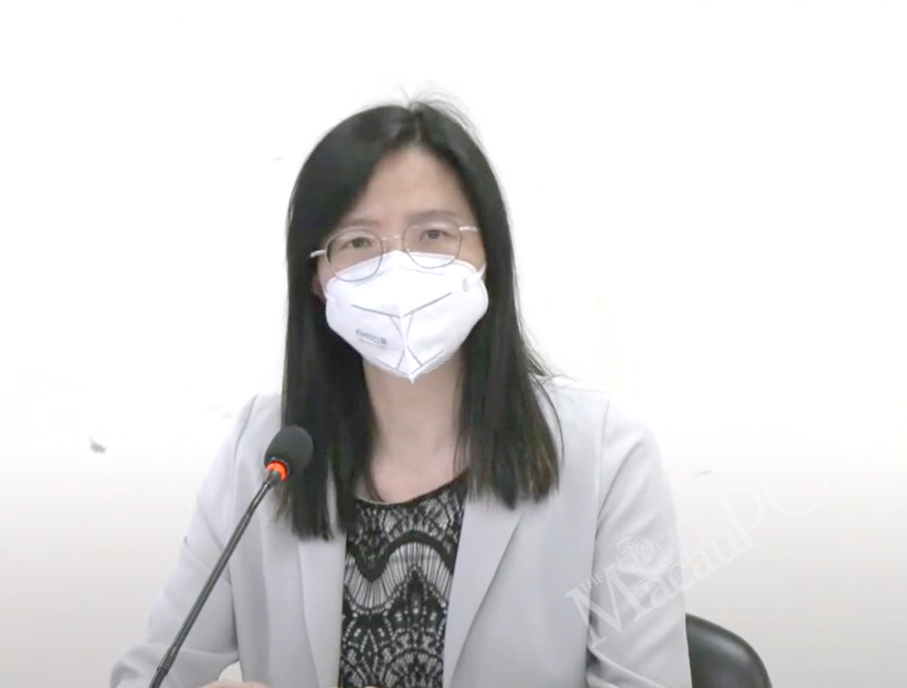
Leong Iek Hou, who heads the Health Bureau’s (SSM) Communicable Disease Prevention and Control Division, addresses yesterday’s press conference about the city’s current COVID-19 outbreak. Photo: GCS
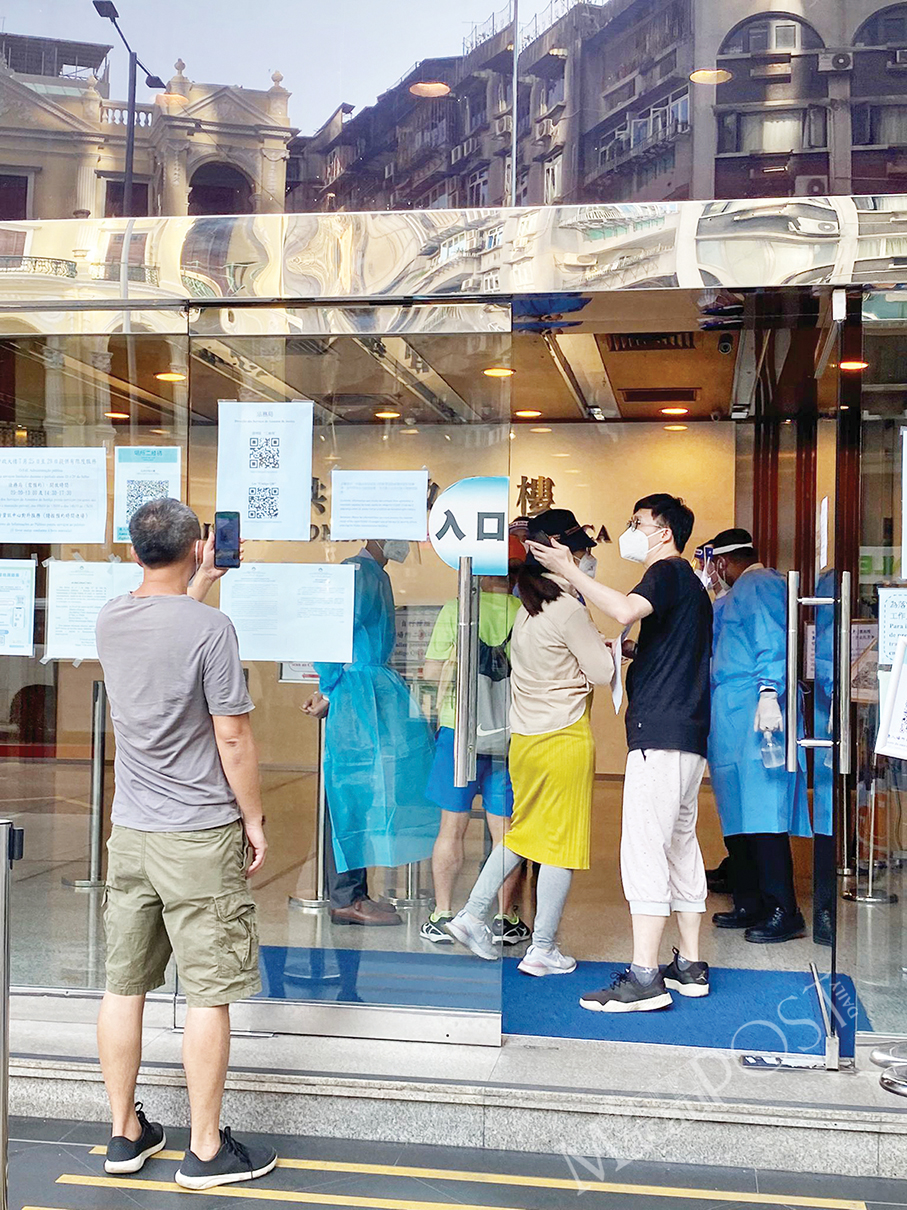
People prepare to enter the Public Administration Building in Rua do Campo yesterday afternoon. Photo: MPDG

